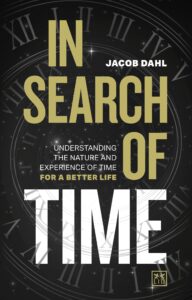|
How do we improve our relationship with time? by Jacob Dahl
By Guest Contributor Jacob Dahl
Author of In Search of Time, Jacob Dahl, explores how we can readjust time to keep the good things and get rid of our bad time habits.
Time is highly useful for us in our daily lives. It makes it possible for us to meet with friends, show up at work, travel, it helps us to communicate electronically and guides our ways via GPS. The list is just endless. Time is so important in our lives that it has become the most used noun in our English vocabulary. But time is also associated with more problematic aspects: many of us feel under immense time pressure, both in our daily lives and when we try to achieve what we aspire to in our lives on Earth. FOMO (Fear of Missing Out) is prevalent and accentuated by our 24/7 always-on society, it has become very visible what we miss out on if we don’t squeeze a bit more out of the time we have.
But despite being the most used noun, do we truly understand what time really is? And have we gotten it a bit wrong over the last hectic evolution of humankind?
The reality is that we really don’t understand the nature of time, as one of our leading physicists Carlo Rovelli says: “The nature of time is perhaps the greatest remaining mystery”. Since the ancient Greeks, there have been numerous efforts to get closer to understanding what time really is coming from widely different angles such as physics, biology, neuroscience, psychology, religion, spirituality, etc. But despite all the scientific progress, we haven’t gotten much closer, we are mostly confused on a higher level.
In my recent book In Search of Time, I try to get a bit closer by looking at time from 10 different lenses – both scientific lenses and humanity/society lenses such as the history of time, time in art & literature, time in business, etc. Acknowledging that time is such a multifaceted entity that not any one lens could give a satisfactory holistic perspective. Let me start by saying that time is still a mystery to me after completing this book, but I’m left with a clear impression that as a physical entity time does not exist, it only exists as a very useful human construct, a macro model of the world to make sense of what we are experiencing.
And we shouldn’t really be too bothered by that, as many of the other elements we experience in life are also quite detached from their real physical nature; we see colors, we see solid structures, we hear sounds, we smell flowers – the physical reality is that we live in a colorless, soundless, smell less web of particles and energy fields probably far less beautiful than the macro models we have created to make sense of it.
But unlike some of the other more seemingly static models of the world, it feels clear to me that since the ancient Romans, we have slowly changed our concept of time in the Western world. First via the church, which made time linear and structured the days. During the industrial revolution, we suddenly made ‘selling time’ the most common way of making a living. And finally, in our current always-on, just-in-time society, our financial markets are managed in literally nanoseconds. This has gradually changed our view on time towards a view that time is a resource that we possess and need to make the most out of – time is money.
So, if we accept the hypothesis that time really only exists as a human construct, can we readjust it a bit so we can keep the good things and get rid of the bad things – or in other words, can we improve our relationship with time?
It is obviously hard to change habits and mindsets which have been ingrained in us for many centuries, but let me offer 3 areas where I do believe we can ‘improve’ as individuals:
1) our false craving for more (free) time;
2) our unnatural fear of death;
3) the unhealthy imbalance in our time perspectives.
Our false craving for more (free) time
As we don’t feel we have enough time, we naturally crave more time, especially more free time. But interestingly, more free time does not make us much happier and too much free time can be negative for our wellbeing if we don’t use it constructively. An interesting research project from the US shows that after 5 hours of free time, getting additional time lowers people’s happiness. The research, furthermore, demonstrates that being social or engaging in sport or intellectually stimulating activities dramatically shifts the curve – time has no value in itself, what counts is what we use it for. Some of the happiest and longest living homo sapiens live in Okinawa, Japan. They follow the ‘Ikigai’ principle of having a life purpose and they don’t stop working just because they reach the retirement age, they just carry on with whatever their life purpose might be, whether it is fishing, teaching or baking bread.
Our unnatural fear of death
Having some fear of death is a good thing for humanity, without it we would take too many unnecessary risks, and probably have far fewer kids and much shorter lives. But have we taken it too far? Research from the UK shows that we spend as much money and energy in saving a 90-year-old’s life as a 60-year-old’s life. We are fighting for more time, but if time really doesn’t exist and is worth nothing in itself, does that make sense both from an individual point of view and from a society point of view? I was very inspired by a discussion I had with a Nigerian when I saw a ‘happy’ funeral in Lagos – he explained that if the deceased reaches more than 70 years, people will celebrate a long happy life. Only if people die young, they will mourn them in the traditional Western way. Likewise, I was inspired by an Asian friend, who had just lost his beloved mother, but could still say that he didn’t have any grief at all as she was already happy in her next life.
The unhealthy imbalance in our time perspectives
The American professor in psychology, George Zimbardo, introduced 5 (later it became 6) human time types, or time perspectives as he labeled them. Either people were mostly focused on the past, the present or the future and either they had a positive or negative mindset about it. It was concluded that happiness increases if the time perspectives are somewhat balanced in an individual between the past, the present and the future. The reality is, however, that the vast majority of us are in imbalance and particularly find it hard to stay present in the present. We get more than 60,000 thoughts per day of which more than 80% are negative, leading us to worry about the near future or regret the past. Our minds take us as hostages and we need to trick our mind back to stay present, and here both meditation and ‘flow’ techniques from positive psychology seem to be very helpful.
So, despite time being our friend in so many aspects of our lives, it is probably time to adjust our friendship a bit to avoid some of the apparent time traps that we have fallen into. And it most likely starts with a realization that after all time doesn’t really exist outside the construct we have created of it in our brains.
ABOUT THE AUTHOR

Jacob Dahl is a Senior Partner Emeritus at McKinsey & Co, a board member and investor. He has an MSc in Economics from Copenhagen University, has worked as a management consultant for 26 years and has lived in Denmark, Europe, Africa and Asia with his wife and four children. Jacob has always been passionate about history, philosophy and physics.
Suggested Reading
 In Search of Time looks at time through ten lenses in order to grasp a better understanding of it, as well as laying out the benefits of getting rid of our self-imposed bad time habits.
In Search of Time looks at time through ten lenses in order to grasp a better understanding of it, as well as laying out the benefits of getting rid of our self-imposed bad time habits.
